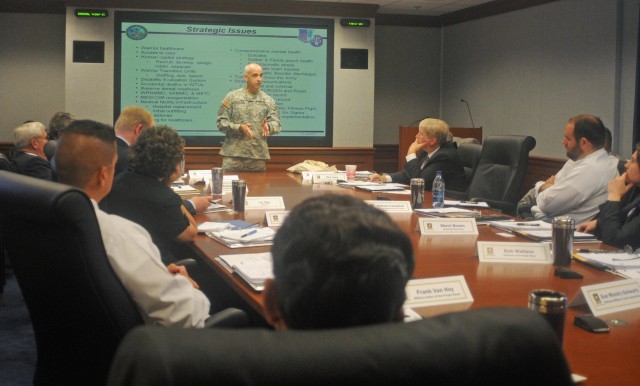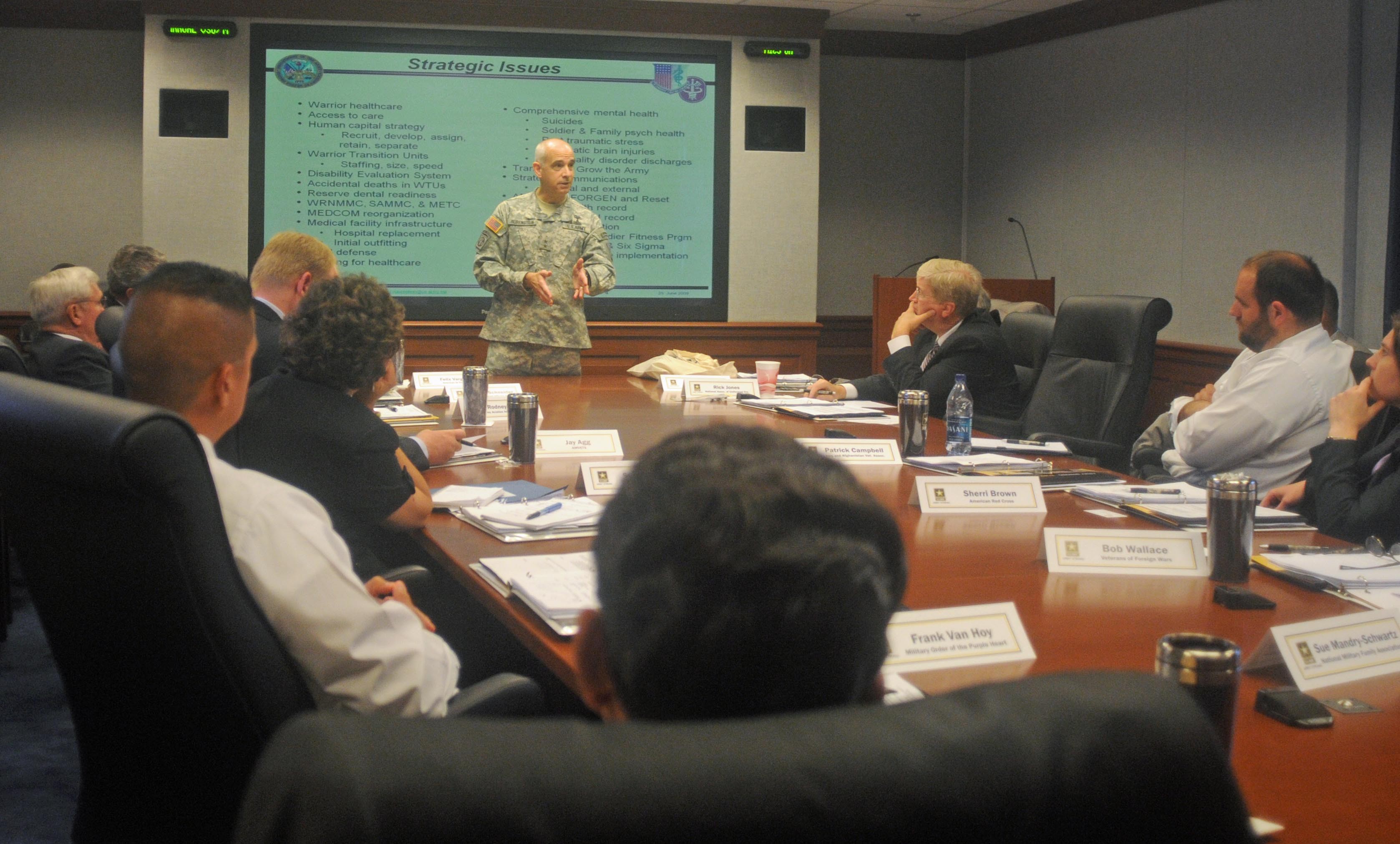WASHINGTON (Army News Service, July 2, 2009) -- The Army's fourth annual leadership conference for veterans' and military-service organizations was held June 26 at the Pentagon, and although a number of issues were discussed, one echoed throughout the day: suicide prevention.
Lt. Gen. David H. Huntoon, director of the Army staff, told the leaders of 14 service organizations about transitions and new problems facing servicemembers.
"We are dealing with suicide, which is a very hard story for us today," Huntoon said. "There have been 87 suicides in the active component alone which, interestingly enough, ties the KIA here to date. That's a disturbing statistic which speaks to tragedy of what we've been calling a 'blue on blue' phenomenon."
Patrick Campbell, chief legislative counsel for the Iraq and Afghanistan Veteran's Association, said that the suicide prevention program should be expanded across DoD.
"We are still taking small bites of this apple," Campbell said. "Although I am glad we have decided to introduce this topic into discussion."
Comprehensive Soldier Fitness Program Director Brig. Gen. Rhonda Cornum explained the Army's preventative measures for suicide and Post Traumatic Stress Disorder.
"Our job is to make them the best Soldiers we can make them," Cornum said. "We look at this plan as if it were a marathon - a psychological marathon. The time to start training for a marathon is not while you are running it, it is long before. We should be able to increase their psychological robustness."
Cornum said four aspects of Soldier's lives will be the primary focus of resiliency training: spiritual, emotional, social and physical.
Soldiers will soon begin mandatory resiliency training as part of basic combat training, Cornum said. She added that Command and General Staff College students at Fort Leavenworth, Kan., will soon begin resiliency training as well. And she said a pilot program in resiliency training will be conducted at Fort Hood, Texas, and Fort Jackson, S.C.
The Army also plans to use a global assessment tool survey to track the progression and regression of mental robustness, Cornum said. The survey is currently being tested, but will be available to all Soldiers in late October, she said.
The GAT survey will be anonymous, Cornum said, and only Soldiers will be able to access their personal score. Soldiers will take the survey upon entering basic training and every two years after.
"I have absolute confidence this will work," Cornum said.
In order to create and sustain programs like Comprehensive Soldier Fitness, the Army's Director of Legislative Liason Maj. Gen. Bernard S. Champoux laid out the legislative priorities for the upcoming year. Legislation, he explained, is designed to sustain, prepare, reset and transform troops and equipment. He added that there will be some funding for suicide prevention in the Army's 2010 budget.
"I feel certain that if this were some kind of IED, we would be spending billions, not millions, of dollars to combat this force," Campbell of IAVA said about suicide prevention.
"It's not as easy as just throwing money at it," Champoux replied. "We are not asking Congress for relief with legislation -- you can't look at a request for funds and use that to measure how sincere we are."
Jay Agg, AMVETS national communications director, said suicide is "an issue important to everyone, and opening these types of dialogues can only be helpful and fruitful."
"There are many causes and influences that are associated with suicide," Agg said. "But meeting with Army, and talking to experts and hearing first-hand what they've experienced and learned, really helps us develop our plans and efforts."
Brig. Gen. Colleen McGuire discussed the findings and data of the Army campaign for suicide prevention led by her Suicide Prevention Task Force.
McGuire described what she called a "dip stick" effect. While the programs are being carried out correctly, they are not always reaching Soldiers in the way they should, she said.
"With the cumulative effects and simultaneous transitions we've been through, the institutions didn't know what commanders needed and commanders didn't know what institutional Army had to offer," McGuire said.
McGuire's said her objective is to "inculcate" suicide education into the daily lives of Soldiers.
Secretary of the Army Pete Geren assured the veteran leaders that suicide prevention was being taken very seriously by the Army.
"With absolute certainty, suicide prevention is a serious undertaking," Geren said, "and we will provide the efforts and resources it needs."
Geren called on civilians to support military families by grass-roots movements based on "neighbors helping neighbors."
Manpower supported by communities can accomplish more than a departmental effort, Geren said.
Certainly having so many topics addressed was useful and insightful, said Agg of AMVETS. "Generally speaking, it is good for Army to be fostering that relationship. We [veterans organizations] have been able to talk about strategic partnerships and how we can better serve men and women in uniform."




Social Sharing